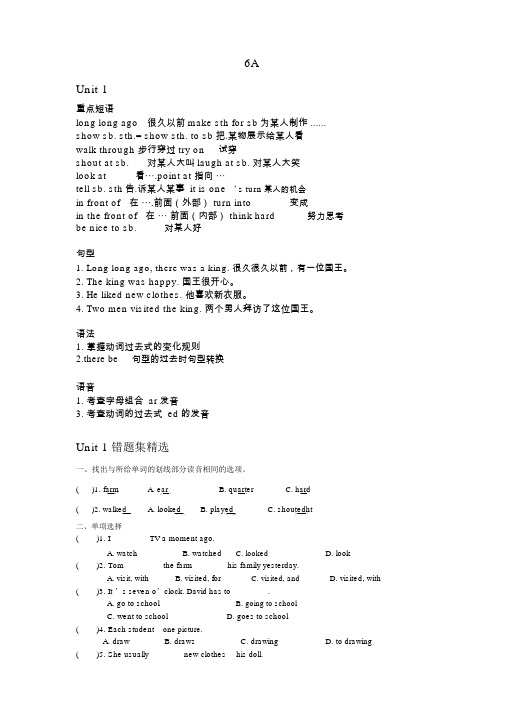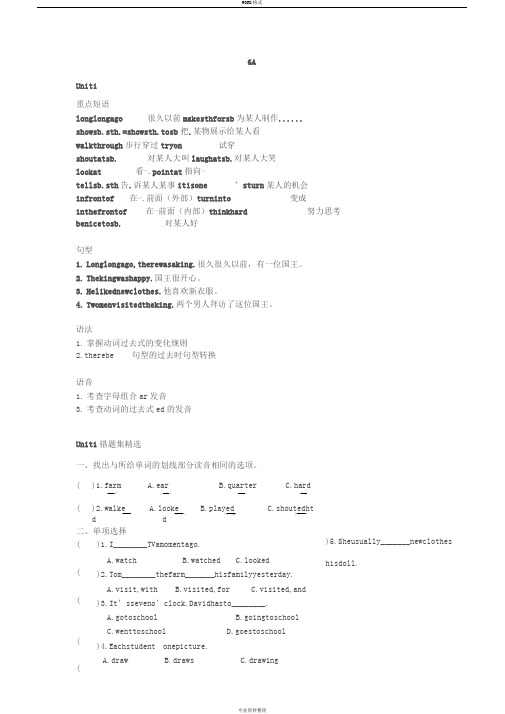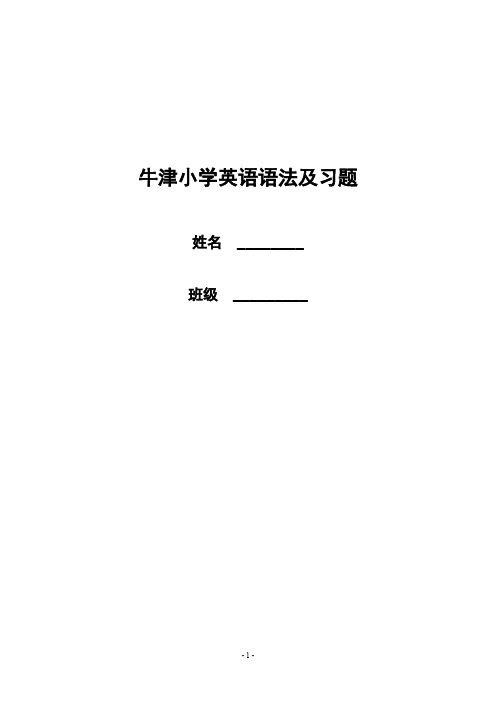牛津小学英语总复习语法及练习
- 格式:docx
- 大小:139.72 KB
- 文档页数:83

上海牛津小学英语语法知识总结一般现在时1、定义:表示经常发生或习惯性的动作、状态。
句中通常有usually,often,every day,sometimes,always,at weekends,on Sundays等表示经常性时间的短语。
2、构成:1)当谓语是be动词时,一般现在时的构成:主语+be动词+其他如:I am a student. He is Jim’s father.They are from Japan.2)当谓语是行为动词时,一般现在时的构成:①主语(非第三人称单数)+动词原形+其他如:I often watch TV at the weekends.Mr Green and Mrs Green like collecting stamps.②主语(第三人称单数)+动词的第三人称单数形式+其他如:Jim usually visits his grandparents on Sundays.She sometimes goes to the park with her mother.3、动词三单形式的变化规则:•一般情况下,直接加s 如:read-reads,swim-swims•以s,x,sh,ch,o结尾,加es 如:wash-washes,watch-watches,do-does•以辅音字母+y结尾,变y为i,再加es 如:study-studies,fly-flies•不规则变化如:have-has4、一般现在时的句型转换:肯定句否定句一般疑问句及回答They watch TV every day. They don’t watch TVevery day.—Do they watch TV every day?—Yes, they do. / No, they don’t.She watches TV every day. She doesn’t watchTV every day.—Does she watch TV every day?—Yes, she does. / No, she doesn’t.现在进行时1、定义:表示现在或现阶段正在进行或发生的动作。

(一)一般过去时1.一般过去时表示过去某个时间发生的动作或存在的状态,常和表示过去的时间状语连用。
一般过去时也表示过去经常或反复发生的动作感谢。
2.Be动词在一般过去时中的变化:⑴am 和is在一般过去时中变为was。
(was not=wasn’t)⑵are在一般过去时中变为were。
(were not=weren’t)⑶带有was或were的句子,其否定、疑问的变化和is, am, are一样,即否定句在was或were后加not,一般疑问句把was或were调到句首。
3.句中没有be动词的一般过去时的句子否定句:didn’t +动词原形,如:Jim didn’t go home yesterday.一般疑问句:在句首加did,句子中的动词过去式变回原形。
如:Did Jim go home yesterday?特殊疑问句:⑴疑问词+did+主语+动词原形?如:What did Jim do yesterday?⑵疑问词当主语时:疑问词+动词过去式?如:Who went to home yesterday?动词过去式变化规则:1.一般在动词末尾加-ed,如:pull-pulled, cook-cooked2.结尾是e加d,如:taste-tasted3.末尾只有一个元音字母和一个辅音字母的重读闭音节,应双写末尾的辅音字母,再加-ed,如:stop-stopped4.以“辅音字母+y”结尾的,变y为i,再加-ed,如:study-studied过去时练习写出下列动词的过去式is\am_________ fly_______ plant________ are ________drink_________ play_______ go________ make ________does_________ dance________ worry________ ask _____taste_________ eat__________ draw________ put ______throw________ kick_________ pass_______ do ________一、用行为动词的适当形式填空1. He _________ (live) in Wuxi two years ago.2. The cat ________ (eat) a bird last night.3. We _______ (have) a party last Halloween.4. Nancy ________ (pick) up oranges on the farm last week.5. I ________ (make) a model ship with Mike yesterday.6. They ________ (play) chess in the classroom last PE lesson.7. My mother _______ (cook) a nice food last Spring Festival.8. The girls ________ (sing) and _______ (dance) at the party.9. I ______ (watch) a cartoon on Saturday.10. Her father _______ (read) a newspaper last night.11. We _________ to zoo yesterday, we _____ to the park. (go)12. ______ you _______ (visit) your relatives last Spring Festival?13. ______ he _______ (fly) a kite on Sunday? Yes, he ______.14. Gao Shan _______ (pull) up carrots last National Day holiday.15. I ____________ (sweep) the floor yesterday, but my mother ______.16. What ______ she _______ (find) in the garden last morning? She __________ (find) a beautiful butterfly.二、句型转换1. Su Hai took some photos at the Sports day.否定句:________________________________________________一般疑问句:____________________________________________肯、否定回答:__________________________________________2. Nancy went to school early.否定句:________________________________________________一般疑问句:____________________________________________肯、否定回答:__________________________________________过去时综合练习一、用动词的适当形式填空1. It ______ (be) Ben’s birthday last Friday.2. We all ______ (have) a good time last night.3. He ________ (jump) high on last Sports Day.4. Helen ________ (milk) a cow on Friday.5. She likes ______ newspapers, but she ______ a book yesterday. (read)6. He _______ football now, but they _______ basketball just now. (play)7. Jim’s mother _________ (plant) trees just now.8. _______ they ________ (sweep) the floor on Sunday? No, they _____.9. I _______ (watch) a cartoon on Monday.10. We ___________ (go) to school on Sunday11. It _____ (be) the 2nd of November yesterday. Mr White ________ (go) to his office by car.12. Gao Shan ________ (put) the book on his head a moment ago.13. Don’t ______ the house. Mum _______ it yesterday. (clean)14. What ____ you ______ just now? I _______ some housework. (do)15. They _________ (make) a kite a week ago.16. I want to ______ apples. But my dad _______ all of them last month. (pick)17. _______ he ______ the flowers this morning? Yes, he _____. (water)18. She ____ (be) a pretty girl. Look, she _____ (do) Chinese dances.19. The students often _________ (draw) some pictures in the art room.20.What ______ Mike do on the farm? He ________ cows. (milk)二、中译英1. 我们上周五看了一部电影。

6AUnit 1重点短语long long ago很久以前make sth for sb为某人制作...... show sb. sth.= show sth. to sb把.某物展示给某人看walk through 步行穿过 try on试穿shout at sb.对某人大叫laugh at sb.对某人大笑look at看⋯.point at指向⋯tell sb. sth告.诉某人某事 it is one’ s turn某人的机会in front of在⋯.前面(外部)turn into变成in the front of在⋯ 前面(内部)think hard努力思考be nice to sb.对某人好句型1.Long long ago, there was a king. 很久很久以前,有一位国王。
2.The king was happy. 国王很开心。
3.He liked new clothes. 他喜欢新衣服。
4.Two men visited the king. 两个男人拜访了这位国王。
语法1.掌握动词过去式的变化规则2.there be句型的过去时句型转换语音1.考查字母组合 ar 发音3.考查动词的过去式 ed 的发音Unit 1 错题集精选一、找出与所给单词的划线部分读音相同的选项。
()1. farm A. ear B. quarter C. hard()2. walked A. looked B. played C. shoutedht二、单项选择( ( ( ( ()1. I ________ TV a moment ago.A. watchB. watchedC. looked)2. Tom ________ the farm _______ his family yesterday.A. visit, withB. visited, forC. visited, and)3. It ’s seven o’clock. David has to ________.A. go to schoolB. going to schoolC. went to schoolD. goes to school)4. Each student one picture.A. drawB. drawsC. drawing)5. She usually _______ new clothes his doll.D. lookD. visited, withD. to drawing( ( ( ( (A. makes, withB. make , forC. makes, forD. make, with)6. The lion always walks ______ the forest every day.A. onB. underC. throughD. behind)7. The witch( 女巫 ) the prince a lion.A. turned , onB. talked, with ,C. told , aboutD. turned ,into )8. The clothes are beautiful. Please ______________.A. try it onB. try on themC. try them onD. try on it)9. The shoes are very cool, but they me.A. are fittingB. fitC. don’tfitD. fitted)10. Yesterday Nancy was sick, her mother her carefully.A. looked afterB. looked atC. looked forD. looked out三、句型转换1. The two men showed the king his new clothes.(同义句转换)The two men his new clothes the king.2. There were some apples in the street. (改为否定句)There _________ _________ apples in the street.3. My uncle lives in a big city.(用two years ago改写)My uncle ________ in a big city two years ago.答案:一1.C2.A解析:清辅音 +ed,发 /t/; 浊辅音或元音 +ed,发 /d/; t+ed, 发 /id/二1.B解析:出现 ago,所以用过去时,看电视应该用watch2.D解析:出现 yesterday 用过去时, with 表示“和” ,放在句末3.A解析: have to 中 to 后面用动词原形4.B解析: each 后接单数可数名词,且谓语动词用单数5.C解析: usually 用一般现在时,主语为第三人称单数,所以用三单式;make sth for sb6.C解析:考查方位介词,“穿过森林”应该用through;7.D解析: turn sb into ... 固定短语8.C解析: try on 表示“试穿” ,后接代词用宾格,且放在中间9.C解析:根据 but 这一转折,所以要用否定,fit 的否定要用助动词do10.C 解析: look 的短语, look after 照顾, looked at 看 ......, looked for 寻找, looked out向外看三1.showed to 解析:考查 show 的短语2.weren’t any 解析:考查一般过去时的否定句转化3.lived 解析:考查动词的过去式Unit 2重点短语by bike 骑自行车look sad 看起来伤心hold on抓紧fly away飞走= ride a bike骑自行车on Monday morning在星期一早上难点:表示天气的名词与相应的形容词转化rain( 名词 )rainy(形容词)rain( 动词 )句型1. It was sunny / cloudy/ windy. 天气是晴朗的/ 多云的 / 有风的。

6AUnit1重点短语longlongago很久以前makesthforsb为某人制作...... showsb.sth.=showsth.tosb把.某物展示给某人看walkthrough步行穿过tryon试穿shoutatsb.对某人大叫laughatsb.对某人大笑lookat看⋯.pointat指向⋯tellsb.sth告.诉某人某事itisone’sturn某人的机会infrontof在⋯.前面(外部)turninto变成inthefrontof在⋯前面(内部)thinkhard努力思考benicetosb.对某人好句型1.Longlongago,therewasaking.很久很久以前,有一位国王。
2.Thekingwashappy.国王很开心。
3.Helikednewclothes.他喜欢新衣服。
4.Twomenvisitedtheking.两个男人拜访了这位国王。
语法1.掌握动词过去式的变化规则2.therebe 句型的过去时句型转换语音1.考查字母组合ar发音3.考查动词的过去式ed的发音Unit1错题集精选一、找出与所给单词的划线部分读音相同的选项。
( )1.farm A.ear B.quarter C.hard( )2.walked A.lookedB.playedC.shoutedht二、单项选择( ( ( ( ( )1.I________TVamomentago.A.watchB.watchedC.looked)2.Tom________thefarm_______hisfamilyyesterday.A.visit,withB.visited,forC.visited,and)3.It’sseveno’clock.Davidhasto________.A.gotoschoolB.goingtoschoolC.wenttoschoolD.goestoschool)4.Eachstudent onepicture.A.drawB.drawsC.drawing)5.Sheusually_______newclotheshisdoll.D.lookD.visite d,withD.todrawi ng( ( ( ( (A.makes, withB.make, forC.makes, forD.make, with)6.Thelionalwayswalks______theforesteveryday.A.onB.underC.throughD.behind)7.Thewitch(女巫) theprince alion.A.turned, onB.talked, with,C.told, aboutD.turned, into )8.Theclothesarebeautiful.Please______________.A.tryitonB.tryonthemC.trythemonD.tryonit)9.Theshoesareverycool,butthey me.A.arefittingB.fitC.don’tfitD.fitted)10.YesterdayNancywassick,hermother hercarefully.A.lookedafterB.lookedatC.lookedforD.lookedout三、句型转换1.Thetwomenshowedthekinghisnewclothes. (同义句转换)Thetwomen hisnewclothestheking.2.Thereweresomeapplesinthestreet.(改为否定句)There__________________applesinthestreet.3.Myunclelivesinabigcity. (用twoyearsago改写)Myuncle________inabigcitytwoyearsago.答案:一1.C2.A解析:清辅音+ed,发/t/;浊辅音或元音+ed,发/d/;t+ed,发/id/二1.B 解析:出现ago,所以用过去时,看电视应该用watch2.D解析:出现yesterday用过去时,with表示“和”,放在句末3.A解析:haveto中to后面用动词原形4.B解析:each后接单数可数名词,且谓语动词用单数5.C 解析:usually用一般现在时,主语为第三人称单数,所以用三单式;makesthforsb6.C解析:考查方位介词,“穿过森林”应该用through;7.D解析:turnsbinto...固定短语8.C解析:tryon表示“试穿”,后接代词用宾格,且放在中间9.C解析:根据but这一转折,所以要用否定,fit的否定要用助动词do10.C解析:look的短语,lookafter照顾,lookedat看......,lookedfor寻找,lookedout 向外看三1.s howedto解析:考查show的短语2.w eren’tany解析:考查一般过去时的否定句转化3.l ived解析:考查动词的过去式Unit2重点短语 bybike 骑自行车= rideabike骑自行车looksad 看起来伤心抓紧飞走 onMondaymorning在星期一早上难点:表示天气的名词与相应的形容词转化rain(名词)rainy (形容词)rain(动词)句型1.Itwassunny/cloudy/windy.天气是晴朗的 /多云的/有风的。


牛津小学英语语法复习要点:一般现在时一、一般现在时:一般现在时基本用法介绍一般现在时的功能:1. 表示事物或人物的特征、状态。
如:The sky is blue. 天空是蓝色的。
2. 表示经常性或习惯性的动作。
如:I get up at six every day. 我每天六点起床。
3. 表示客观现实。
如:The earth goes around the sun. 地球绕着太阳转。
一般现在时的构成:1. be动词:主语+be(am, is, are)+ 其它。
如:I am a boy.我是一个男孩。
注意:(我用an,你用are ,三单is,复数are。
)2. 行为动词:主语+行为动词(+其它)。
如:We study English.我们学习英语。
注意:(当主语为第三人称单数(he, she,it)时,要在动词后加"-s"或"-es"。
如:Mary likes Ch in ese. 玛丽喜欢汉语。
)一般现在时的变化:1. be动词的变化。
肯定句:主语+be+其它。
女口:He is a worker. 他是工人。
否定句:主语+ be + not + 其它。
He is not a worker. 他不是工人。
一般疑问句:Be +主语+其它。
(be动词移到句首)女口:I am a student.-Are you a stude nt?-Yes. I am. / No, I'm n ot.特殊疑问句:疑问词+—般疑问句。
女口:My bike is under the tree.Is your bike under the tree? _____Where is your bike?2. 行为动词的变化。
肯定句:主语+动词原形(+其它)。
否定句:主语+ don 't( does n't ) + 动词原形(+其它)。
女如:I like bread.I don't like bread.当主语为第三人称单数时,要用does n't构成否定句。
牛津重点小学英语语法复习Revised final draft November 26, 2020牛津小学英语语法复习一、时态1.一般现在时(1)表示经常发生的动作或事情,通常用“usually,often,everyday,sometimes,always,never”等词。
2.现在进行时,(1)表示正在发生的动作,通常用“now,look”.(2)基本形式:be+动词+ingeg:Iam(not)doingmyhomework.You/We/Theyare(not)reading.He/She/Itis(not)eating.Whatareyoudoing?Ishereading?3.一般过去时态(1)表示过去已经发生的事情,通常用“lastweek,justnow,yesterday”等词。
(2)be动词的过去式:am/is—wasare—wereI/He/she/itwas(not)….You/we/theywere….一般疑问句was,were放在句首。
(4)动词过去式的变化:不规则动词的变化:原形过去式原形过去式原形过去式原形过去式sweep swept teach taught have had go went keep kept think thought do did find found sleep slept buy bought eat ate say said feel felt drink drank is/am was take took read read give gave are were mean meant put put sing sang drive drove meet met cut cut begin began speak spoke make made let let ring rang write wrote see saw fly flew run ran ride rode come came draw drew sit sat hear heard tell toldgrow grew learn learned/learntget got know knew4.一般将来时一般将来时表示将来打算做的事或将要发生的事情。
语法及练习1 be动词Be 动词的用法:(1) Am--was Is --was Are--were 口诀:我用am, 你用are, is用在他她它,复数全用are。
(2) 肯定和否定句I am (not) from London. He is(not) a teacher. She is(not) in the dining room. My hair is(not) long. Her eyes are(not) small.(3) 一般疑问句Am I a Chinese? Yes, you are. No, you aren’t. Are they American? Yes, they are. No, they aren’t. Is the cat fat? Yes, it is. No, it isn’t.There be 句型与have, has的区别1、There be 句型表示:在某地有某物(或人)2、在there be 句型中,主语是单数,be 动词用is ; 主语是复数,be 动词用are ; 如有几件物品,be 动词根据最*近be 动词的那个名词决定。
3、there be 句型的否定句在be 动词后加not , 一般疑问句把be 动词调到句首。
4、there be句型与have(has) 的区别:there be 表示在某地有某物(或人);have(has) 表示某人拥有某物。
5、some 和any 在there be 句型中的运用:some 用于肯定句,any 用于否定句或疑问句。
6、and 和or 在there be句型中的运用:and 用于肯定句,or 用于否定句或疑问句。
7、针对数量提问的特殊疑问句的基本结构是:How many + 名词复数+ are there + 介词短语?How much + 不可数名词+ is there + 介词短语?8、针对主语提问的特殊疑问句的基本结构是:What’s + 介词短语?用恰当的be动词填空。
牛津小学英语语法复习一、时态1. 一般现在时(1)表示经常发生的动作或事情,通常用“ usually, often, every day, sometimes, always,never ” 等词。
(2)基本结构:(3)动词第三人称单数形式2. 现在进行时,(1)表示正在发生的动作,通常用“ no w,look(2)基本形式:be + 动词+ingeg: I am(not) doing my homework. You/We/They are(not) read ing. He/She/lt is( not) eati ng. What are you doing?Is he readi ng?(3)动词的现在分词形式(do+ing )3. 一般过去时态(1)表示过去已经发生的事情,通常用“last week, just now, yesterday ” 等词。
(2)be 动词的过去式:am/is —was are —werel/He/she/it was( no t),. You/we/they were,.一般疑问句was, were放在句首。
(3)过去式基本结构不规则动词的变化:原形过去式原形过去式原形过去式原形过去式sweep swept teach taught have had go went keep kept thi nk thought do did find found sleep slept buy bought eat ate say said feel felt drink drank is/am was take took read read give gave are were mea n meant put put sing sang drive drove meet met cut cut begi n bega n speak spoke make made let let ring rang write wrote see saw fly flew run ran ride rode come came draw drew sit sat hear heard tell toldgrow grew learn learned/learntget got know knew4.一般将来时一般将来时表示将来打算做的事或将要发生的事情。
语法及练习 1 be 动词Be 动词的用法:(1) Am--was Is --was Are--were口诀:我用am, 你用 are, is 用在他她它,复数全用are。
(2) 肯定和否定句I am (not) from London. He is(not) a teacher. She is(not) in the dining room.My hair is(not) long. Her eyes are(not) small.(3) 一般疑问句Am I a Chinese? Yes, you are. No, you aren’ t. Are they American? Yes, they are. No, they aren’ t. Is the cat fat? Yes, it is. No, it isn’ t.There be 句型与 have, has 的区别1、 There be 句型表示:在某地有某物(或人)2、在 there be 句型中,主语是单数, be 动词用 is ; 主语是复数, be 动词用 are ; 如有几件物品, be 动词根据最 * 近 be 动词的那个名词决定。
3、 there be 句型的否定句在4、 there be 句型与 have(has) be 动词后加 not ,的区别: there be一般疑问句把be 动词调到句首。
表示在某地有某物(或人);have(has) 表示某人拥有某物。
5、some 和 any 在 there be 句型中的运用: some 用于肯定句,any 用于否定句或疑问句。
6、 and 和 or 在 there be 句型中的运用:and 用于肯定句,or 用于否定句或疑问句。
7、针对数量提问的特殊疑问句的基本结构是:短语?How much +不可数名词+ is there +How many +介词短语?名词复数+ are there + 介词8、针对主语提问的特殊疑问句的基本结构是:用恰当的be 动词填空。
学习好资料欢迎下载Fill in the bla nk with “ have, has" or “ there is , there are"I. 1 ______ a good father and a good mother.2. ___________ a telescope on the desk.3. He ________ a tape-recorder.4. ____________ a basketball in the playgro und.5. She _________ some dresses.6. They ___________ a n ice garde n.7. What do you __________ ?8. ____________ a read in g-room in the build ing?9. What does Mike __________ ?10. _____________ any books in the bookcase?II. My father _________ a story-book.12. ______________ a story-book on the table.13. ______________ any flowers in the vase?14. How many stude nts ___________ in the classroom?15. My pare nts __________ some nice pictures.16. ___________ some maps on the wall.17. _____________ a map of the world on the wall.18. David _________ a telescope.学习好资料欢迎下载19. David's friends __________ some ten ts.20. _____________ many childre n on the hill.学习好资料欢迎下载______________________________ 1.写出下列各词的复数open7. 写出下列各词的近义词learn _______ find ________ n ear ______ ust now ______talllast young 写出下列动词的过去式 4.学习好资料欢迎下载学习好资料欢迎下载______________________________look _______ d esk ______ picture _______ big _________small __________ tall _________ liste n__________ q uick ___________nice ________ cup ______ speak __________________mum _______ dad ________ p urse _____ excit ing _____8. 写出下列各词的同音词to ________ b y ______ f or _______ there ___________see _____ right ______ w ho's _________ I ____________aren't ______ here __________ father__________ son _______________pear ______ no ____________ be______________ hi _________________用动词的适当形式填空1.1 _____ to school from Mon day to Friday. My brother ofte n______ to school with me. Y esterday we ______ to school together. We like to school very much. ( go )2. They usually _______ l unch at home. But last week, they___ lunch at school. ( have )3. That ____ m y En glish book. It _____ n ew. But now it____ not here. It _____ t here a moment ago. ( be )4. My sister likes _______ very much. She ofte n _______ atour school festival. Last term, she ______ a lot of songs学习好资料欢迎下载______________________________in the school hall. She ____ beautifully. ( sing )5. What ____ he usually _______ on Sun day? He usuallyhis homework. Look! He his homework now. he his homework last Sun day? Y es, he ______ . ( do )6. Do people usually ______ moon cakes at Mid-autu mn Festival? Y es, they do. Did you _______ moon cakes last Mid-autu mn Festival? Y es, I did. I _____ a lot ofdelicious moon cakes. ( eat )7. --- How ______ you? ------- 1____ fine. Tha nk you. ——Where ____ you yesterday?----1 ___ at home with my family——_____ your father at home, too?——Yes, he ____ . ( be )8. Ja ne is a dan cer. She ______ every day.Look! She _______________ now. ( dance )9. Nati onal Day is _______ . A lot of people _______ to Beiji ng two weeksago. ( come )10.She ofte n ______ shopp ing with her mother. She likes _____ shopp ing in the shop. She ______ shopp ing(go )yesterday.学习好资料欢迎下载_______________________________11. My brother _____ a new wallet. I _______ a wallet, too.Our wallets are from our pare nts. We ______ them at a party yesterday. (have )12. Where ____ my CD? It ______ n ot o n the desk now. It_____ there just no w. It ___ my favorite prese nt from my good frie nds. They _______________ my classmates. ( be )按要求改写下列单词:1. they ______ (宾格)2. country ________ (复数)3.close _________ 现在分词)4. two _______ (序数词)5. Japan _________ (形容词)6. I_______ (名词性物主代词)7. paper _____ 复数) 8. swim _________ (现在分词) 九、选择正确答案,并把答案的编号写在相应的括号内( )(1). Classes beg in ______ seve n fifty -five .A. inB. onC. atD. for ( )(2). They ofte n help ______ .A. IB. mi neC. myD. me ( )(3). I want _______ a map of China .A. buyB. is buyingC. to buyD. ambuying( )(4). Is it a picture ______ your school ?A. ofB. toC. andD. with )(5). Do you like ______ ?(学习好资料欢迎下载_____________________________A. swimB. swimmi ngC. are swimmi ngD. swim,too( )(6). The man ______ a stick (手杖)is my gran dpa .A. andB. ofC. withD. for ( )(7). Who's the lady ______ b lue ?A. inB. onC. atD. with ( )(8). We usually stay ______ h ome ____ Saturdayafter noon .A. at …inB. at …onC. in …atD. on …on( )(9). A: It's a white shirt , is it yours ? B: No, _____is yellow .A. IB. MyC. Mi neD. Me ( )(10). ______ any men in the room ?A. Is thereB. Are thereC. There arerltD. There isn't( )(11). The bed ______ the right is yours .A. onB. inC. atD. of( )(12). Look at picture .A. oneB. the oneC. firstD. thefirst( )(13). These books are my ________ .D.'C. stude nts s' B. stude nt A. stude nts学习好资料欢迎下载_____________________________stude nts of( )(14). My pare nts ofte n tell me _____ Chi na .A. aboutB. fromC. forD. by( )(15). ______ any food in the fridge ?A. Are thereB. Is thereC. HaveD. Has六、用括号内的词的适当形式填空5'1. A: Where _______ you just now? (be)B: I ________ i n the teachers office.2. Look! Liu Tao _________ i n the classroom. But just now he_______ in the teachers office. (be)3. Liu Tao ofte n _____ (get) up at six .It's six o'clock.But he ______________ (sleep) now.4. My brothers ________ (like) ask ing _______ ( I ) some questio ns.5. ____________ (not walk) on the grass .6. What _______ (do) Jim usually do on weeke nds?用“ be动词”或“助动词”的适当形式填空:1. It a quarter to ten . We hav ing an En glish less on.2. They my pare nts . They doctors. sunny.Sun day mornin g. It 3. It学习好资料欢迎下载-------------------------------4. it ofte n rai n in spri ng? No , it5. you from the USA? Y es, I .6. What Miss Li doi ng now?7. you ofte n play football together? No,we .8. What Su Yang and her sister do at the weeke nds?9. there any apples in the bag ? Yes,there .10. he like singing ? Yes , he .11. There a pen cil-box and some books in the desk.12. quiet , please.13. climb the tree .14. I'll a goalkeeper.15. you at home last ni ght ? No , I .16.Mike go shopp ing this ? No ,he.17. there a lot of snow in win ter? No ,there ■18. you feel tired? Y es, we .19. the ball here just now ? No , it .20. we going to see a play this weeke nd? Yes ,we. your mother like best ?21.Which season学习好资料欢迎下载 --------------------------22. How many bananas you have ?23. How many cars there in the park24.How far it from here ?25.What ani mals you going to see tomorrow?代词练习用括号中所给代词的适当形式填空1. Who can help ______ (she) to carry the box?2. Mum, we are very hun gry. Give _____ (we) some bread,please.3. This is my puppet. That's _____ (you) puppet.4. Open the door for ______ (I), please.5. Today is _____ (she) birthday.6. David got a computer from _____ (he) pare nts.7. This is your classroom. _____ (our) is n ext to the teachers' office.8. My un cle has a daughter. He loves ____ (she) very much.9. Tommy has a cute cat. _____ (it) n ame is Kitty.10. Are there _____ (some) read ing rooms in this build ing?11. ---- U like collect ing coins very much.——_____ (I) too.12. ---- Is there _____ (some) water in the bottle?学习好资料欢迎下载 ---------------------------------- Yes, there is.13. ---- Whose books are these?----They're ______ (they), I thi nk.14. ---- How many stude nts have ____ (they) birthdaysin May?----No one.15. What's the matter with _____ ? D you have problems with _____ homework? (you)将来时理论及练习姓名 _______ 班级___________一般将来时:一、概念:表示将要发生的动作或存在的状态及打算、计划或准备做某事。